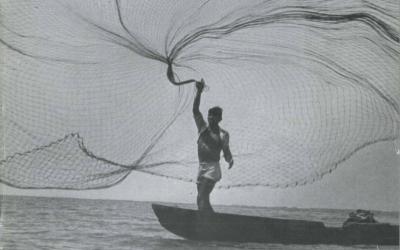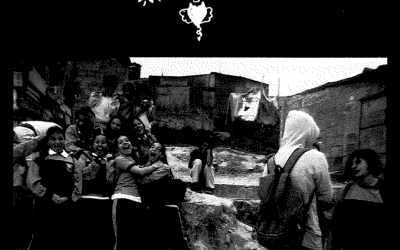Vallenpaz
A Regional Corporation for Peave and Development in Colombia

A guerrilla boy from the Colombian Armed Revolutionary Forces. Photo by Stephen Ferry.
Parish of La María in the outskirts of Cali, May 30, 1999.
As more than one hundred men, women and children of all ages attended Sunday religious services, a heavily armed guerrilla group stormed into the church and shoved the churchgoers out on a long and painful walk through the mountains. They were the victims of the first mass kidnapping in Colombia. All Colombians and the people of Cali, in particular, were in a state of shock. Some of Caliæs leaders organized weekly meetings to discuss possible ways to cope with the situation.
People were sudden aware of the fact that Cali and its valley were surrounded by heavily armed groups, present in the Central and Western ranges of the Andes as well as in the entire Pacific Coast, including the outskirts of Buenaventura, Colombia’s main port. There was also recognition of the fact that, despite the successful development of agro-industrial economic enterprises in the Cauca Valley, peasants from the surrounding mountains were living in extreme poverty and isolation.
Discussion and analysis of the situation led to the conclusion that the solution to violence and its related social problems went beyond law enforcement and military action. Rather, it required effective and efficient interventions to promote the economic development and social reconstruction of isolated peasant communities. This led, in turn, to the decision to create the Corporation for the Development and Peace of South-Western Colombia (VALLENPAZ).
The mission of VALLENPAZ is to contribute to the achievement of peace through social and economic development processes in the rural communities of southwestern Colombia. The Corporation has a wide base of more than seven hundred affiliates from all walks of life. Most of them are citizens who have contributed with a donation of five U.S. dollars; however, some are large companies, financial institutions and non-profit organizations.
The Corporation makes alliances with both the public and private sectors and with international cooperation agencies to channel resources towards community-based productive projects that reactivate local economies.
VALLENPAZ reaches out to the communities most heavily stricken by the armed conflict and encourages them to become organized and plan a feasible, sustainable and environmentally friendly economic project. A team of agronomists, animal scientists and social scientists support the communities through their autonomous process of organization, analysis of alternatives, choice of their project and presentation for financial support.
The Corporation’s interventions are based on a solid educational process that includes training and technical assistance to improve productivity and environmental responsibility. This means that at the same time as communities go through the process of organizing themselves and their projects, they are trained in social skills, conflict resolution, anger management, environmentally friendly farming, farm management, accounting and marketing.
VALLENPAZ complements the work of other private and government organizations with similar objectives. However, our Corporation’s specific mandate is to reach the bottom of the economic ladder; that is to help the poorest of the poor improve their quality of life as a first step, and then to integrate them into the local and national economies as second and hopefully third steps.
VALLENPAZ is currently working in five municipalities of the Cauca Valley province (Dagua, Cali, Palmira, Cerrito and Jamundí) and three municipalities of the neighboring Cauca province (Buenos Aires, Caloto and Guapi). More than three million dollars have been invested in projects carried out by two thousand families in 1,800 hectares of land. Ten thousand people have benefited directly from the work of our Corporation.
Expected results at the end of a five-year period include: strengthened community organizations as rural enterprises fully integrate into the local economy; improvement of productivity through the use of environmentally-friendly technical innovations; establishment of permanent marketing chains and diversification of marketing opportunities; permanent production of food in home gardens to improve nutrition; and adequate supportive infrastructure for production and commercialization.
It is too early to evaluate the impact of VALLENPAZ in terms of the reduction of violence. Two facts, however, are worth mentioning in this respect. The first is that the enthusiastic support of peasant communities has enabled the workers of VALLENPAZ to move freely and undisturbed through guerrilla and paramilitary-controlled areas; the second is the observation that peasant families who participate in our projects remain in their villages despite occasional confrontations and do not flee towards refugee settlements in the cities, as peasants usually do in other parts of Colombia.
VALLENPAZ accepts many different types of collaboration from all kinds of constituents. International Cooperation Agencies as well as private ONGs may fund specific projects, financial institutions may grant small loans to farmers, professionals may offer voluntary work, and other businesses, organizations and people may offer in-kind donations. VALLENPAZ is a meeting point for all those who love Colombia and want to build a better future for its people.
All projects supported by VALLENPAZ are comprehensive and include the following components:
- Production: promotion of organic and clean farming projects with increased productivity and economic sustainability.
- Education: relevant and effective learning processes leading to increased empowerment of the communities to maintain their social and economic reconstruction efforts.
- Social organization: development of entrepreneurial skills, rebuilding of social tissue and construction of social capital.
- Marketing: linking of productive projects to marketing chains through large super-markets, marketing chains and export markets.
- Infrastructure: construction and maintenance of physical infrastructure facilities such as irrigation systems, warehouses, distribution centers, roads, water and sanitation.
- Technical training and technical assistance: providing access to technological innovation which leads to increased productivity and environmental responsibility.
Related Articles
Editor’s Letter
This is a celebratory issue of ReVista. Throughout Latin America, LGBTQ+ anti-discrimination laws have been passed or strengthened.
Editor’s Letter: Colombia
When I first started working on this ReVista issue on Colombia, I thought of dedicating it to the memory of someone who had died. Murdered newspaper editor Guillermo Cano had been my entrée into Colombia when I won an Inter American…
Photoessay: Shooting for Peace
Photoessay: Shooting for PeacePhotographs By The Children of The Shooting For Peace Project As this special issue of Revista highlights, Colombia’s degenerating predicament is a complex one, which needs to be looked at from new perspectives. Disparando Cámaras para la...



